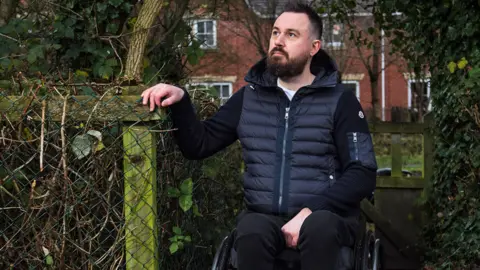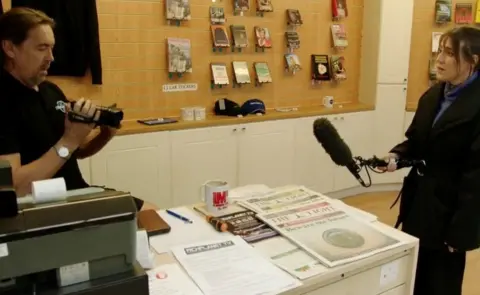Manchester Arena survivors to take 'disaster troll' to court
 BBC / Jon Parker Lee
BBC / Jon Parker LeeManchester Arena bomb survivors have filed landmark legal action against a conspiracy theorist who claims the attack was faked.
Martin and Eve Hibbert, who were left with severe disabilities after the 2017 blast, are suing Richard D Hall for defamation and harassment.
It is the first time such action has been launched in the UK against a conspiracy theorist.
Mr Hall did not respond to the BBC's request for comment.
Martin Hibbert was paralysed from the waist down and his daughter Eve left severely disabled by the Manchester Arena blast which killed 22 people in 2017.
Last October, a Radio 4 podcast series and BBC Panorama investigation revealed they are among victims targeted by conspiracy theorist Richard D Hall, who has described online how he tracks down survivors to their homes and workplaces to see if they are lying about their injuries.
Mr Hall admitted to the BBC that he spied on Miss Hibbert from a vehicle parked outside her home.
He has also described his tactics in a book he sells, and has promoted theories online that several other UK terror attacks were staged.
Now, the family is seeking an injunction to restrain Mr Hall from making similar allegations in future and damages for some of the harm he has caused them.
The case echoes the action against US conspiracist Alex Jones, who was ordered to pay nearly $1.5bn by a US court to families of the US Sandy Hook school shooting after falsely claiming the 2012 attack was a hoax.
"Martin can be seen as a pioneering trailblazer for others to follow if they feel so minded," his lawyer Neil Hudgell said.
Mr Hibbert hopes the action will finally stop Mr Hall and set a UK precedent to help protect other people who survive disasters from these conspiracies and tactics.
"It does sometimes feel like a bit of a weight, so it would be nice to be able to put it to bed and just be able to move on with our lives," he said.

Following the BBC's investigation, Mr Hall's YouTube channel, with over 80,000 followers, was removed and his market stall closed. However, his books and DVDs featuring false claims about terror attacks are still for sale on his website, along with videos about the Manchester Arena Attack.
In December, Mr Hall created a new "True Crime" section on his site listing various events and high-profile deaths, including the recent disappearance of 45-year-old Nicola Bulley.
Mr Hall's defiant response to the BBC investigation and the initial letter from Mr Hibbert's legal team suggests he is yet to change his mind on these conspiracy theories. He continues to defend the book he has written claiming the Manchester Arena attack was staged.
He also says he has received online death threats as a result of the investigation.
But terror attack survivors have also reported that incidents of trolling and conspiracy theories seem to have reduced since it was publicised.
The BBC approached Mr Hall again after the legal case was officially filed, but he did not respond to our request for comment. During the original investigation, when he was confronted at his market stall, he insisted the BBC was wrong about how he operates.
Manchester's Mayor, Andy Burnham, has met Mr Hibbert to discuss campaigning for a new law that could better protect survivors of tragedies from harassment and conspiracy theories.
But such legislation would not be straightforward - social media sites and policy makers have been grappling with hate and disinformation online for some time, with no simple solutions.
"It is always difficult to change the law, and it doesn't happen overnight," Mr Burnham said. "But most people will see the case for this because of the appalling nature of targeting people in this way."
The UK is currently introducing new legislation - the online safety bill - that will mean social media sites have to make commitments to the regulator Ofcom, stating they will protect users.
But there has been lots of debate over how far it will go and it has avoided directly addressing disinformation and abuse targeting adults online due to fears about freedom of expression.
This kind of legislation could face the same opposition.
Listen to the Bonus Episode of Radio 4's Disaster Trolls on BBC Sounds.
